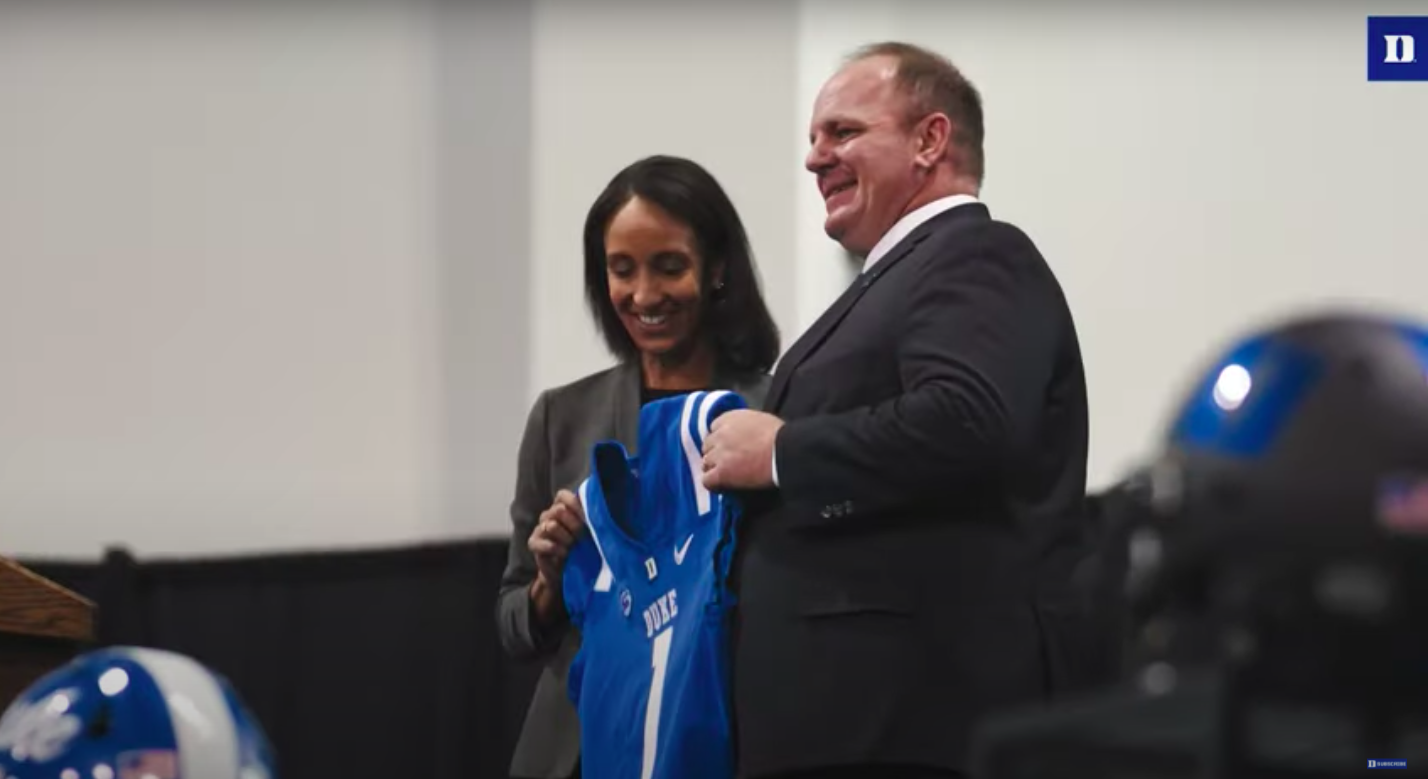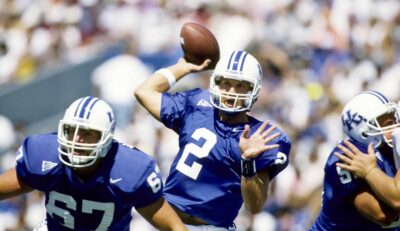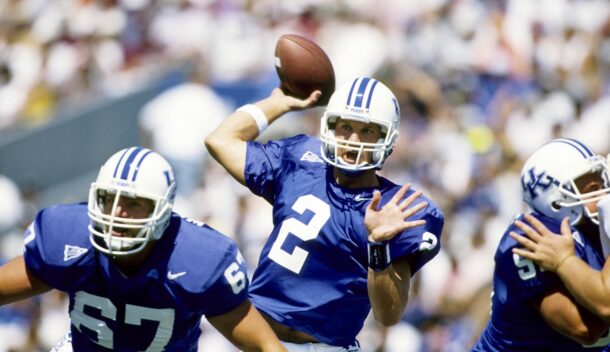
Are we about to finally see a hiring trend shift in college football? Perhaps we should
Mike Elko said the best advice he ever received was “do the best you can at the place you’re at and good opportunities will come to you.”
Take that from someone who spent the past 13 years as an FBS defensive coordinator before getting his first head coaching opportunity at Duke. Four programs, 4 major defensive upgrades, the last 3 of which were at the Power 5 level.
If Elko produced similar results on offense, there’s no doubt that his rise to the head coaching ranks would’ve been quicker. An offensive-minded coach with Elko’s résumé would’ve had opportunities to get a head coaching job at a place with more historical success than Duke. The recent hiring cycles supports that notion.
Since November 2017, we’ve seen 15 SEC head coaches hired. Only 2 (Jeremy Pruitt and Clark Lea) had defensive backgrounds, and there was a 3-year gap between those hires.
In the SEC, only 4 of the 14 head coaches (Mark Stoops, Nick Saban, Kirby Smart and Lea) have defensive-minded backgrounds. Nationally, only 4 of the 15 coaches who were hired to take over before the 2021 season had a defensive-minded background. Currently at the Power 5 level, only 24 of the 65 programs (including Notre Dame) have a defensive-minded head coach.
Is it fair to say that there’s a disadvantage to being a defensive-minded head coach during the hiring process?
“Yeah, it certainly feels that way a bit at times,” Elko told SDS on the latest episode of The Saturday Down South Podcast. “Although I’ve always come back with, when you look at what’s going on in the Playoff every year, you’ve got Luke Fickell, you’ve got Nick Saban, you’ve got Kirby Smart, you’ve got defensive-minded head coaches at the top of the game in so many ways.
“But yeah, at times it does feel like it’s a little hurdle. Everyone just assumes that we don’t know anything about offensive football and we just wanna win games 7-3. Over the years, you just kinda learn how to talk through it, how to put your story across and how to present yourself.”
He’s got a point. Between, Saban, Smart, Fickell and the emerging Dave Aranda, 4 of the final top 5 teams in the AP Poll had a defensive-minded head coach. The lone offensive-minded head coach was Jim Harbaugh, who watched first-year defensive coordinator Mike Macdonald become the missing ingredient for Michigan’s Playoff push. And Michigan also had Heisman Trophy runner-up Aidan Hutchinson, who is projected to be the first defensive player selected in the 2022 NFL Draft.
In 2020, 4 of the final top 10 teams were led by defensive-minded coaches. And within those 10 teams, 4 of them had defensive-minded assistants who became Power 5 head coaches (Brent Venables, Marcus Freeman, Dan Lanning and Elko). That includes Elko, who was one of 11 defensive-minded head coaches hired at the FBS level in this cycle. That’s compared to 17 offensive-minded coaches.
Of the 14 Power 5 programs that hired a head coach this offseason, 7 were defensive-minded coaches, though it was easy to forget that with 2 splashy 9-figure, offensive-minded hires like Brian Kelly and Lincoln Riley.
Dare I say, the times are changing. As they probably should. The pendulum had swung too far in the opposite direction.
Sure, in an era where offense is king, a team without a respectable offensive play-caller is at a significant disadvantage. We’ve seen teams try to kill 2 birds with 1 stone. You can do that with coaches like Dan Mullen, Eli Drinkwitz and Mike Leach, who essentially act as their own offensive coordinator. There are the coaches like Lane Kiffin, who have major offensive input but still defer play-calling duties. Jeff Lebby did that for 2 years at Ole Miss before leaving for total offensive autonomy at Oklahoma. That’s different from say, Mario Cristobal or Sam Pittman, who are offensive-minded head coaches who don’t have any play-calling duties.
But what’s becoming clear is that despite the pre-2021 trend, you don’t need to be dead set on hiring an offensive-minded head coach. Or rather, being a defensive-minded candidate shouldn’t be a demerit in the hiring process.
The SEC’s 3 longest-tenured head coaches are all defensive-minded coaches. Of course, like Elko, they’d probably rather not be put in that type of box. Saban, Smart and Stoops all had to overhaul their offensive strategy at least once at their current jobs. And to their credit, all of those moves yielded historic success for each program. It didn’t matter that those coaches weren’t sitting in the halftime locker room dialing up mid-game offensive adjustments.
There might always be this fear that a defensive-minded head coach won’t know how to handle the ever-important quarterback battle. Lord knows we’ve seen defensive-minded coaches like Will Muschamp and Jeremy Pruitt bungle those spots. Then again, we also just watched offensive-minded coaches like Mullen and Scott Frost make some key personnel mistakes at the game’s most important position. Nobody is immune to that.
Perhaps that’s why we saw major vacancies like Oklahoma, Oregon and Notre Dame filled by defensive-minded coaches. Shoot, even Texas Tech just hired a defensive-minded coach. If that’s not a sign that the pendulum is swinging back in the other direction, I don’t know what is.
At Duke, Elko replaced one of the sport’s most respected offensive minds of the past 3 decades in David Cutcliffe. If Elko’s teams struggle to score points, the default excuse will be “this is why you don’t hire a defensive-minded candidate.” Never mind the fact that Duke, with an offensive-minded head coach, just finished outside the top 50 in scoring for the 6th consecutive season. That excuse would also ignore the fact that the 10 worst FBS offenses in 2021 had a 5-5 split of offensive-minded head coaches to defensive-minded head coaches.
You can still be on the wrong end of 7-3 games with an offensive-minded coach. And as Elko said, 7-3 games aren’t the vision for defensive-minded head coaches. Offense still moves the needle. Even a team with a generational defense like Georgia had an ongoing national debate about whether the offense had enough firepower to win a title. Offense is going to continue to drive discussion in this era of the sport.
Perhaps it just shouldn’t drive the discussion during the hiring process. At least not as much as it appeared to do in the latter half of the 2010s.
That’s exactly when Elko’s rise within the Power 5 ranks began. They say timing in life is everything. In a different era, perhaps we would’ve seen Elko make the leap to becoming a head coach earlier.
But in the end for Elko, the timing still made sense. He just led A&M to the No. 3 defense in America, which will inevitably have no shortage of players selected in the 2022 NFL Draft. Elko’s son, Michael, is finishing up his senior year at College Station High School before heading off to enroll at Northwestern on a baseball scholarship. Elko’s stock had risen even more than when Jimbo Fisher poached him from Notre Dame after the 2017 season.
Still, he insisted that neither timing nor money led to him taking that next step at Duke (he already made over $2 million at A&M). All that mattered was taking the next step at a place where he felt he had support in his vision.
Time to follow that advice once again.
Connor O'Gara is the senior national columnist for Saturday Down South. He's a member of the Football Writers Association of America. After spending his entire life living in B1G country, he moved to the South in 2015.







